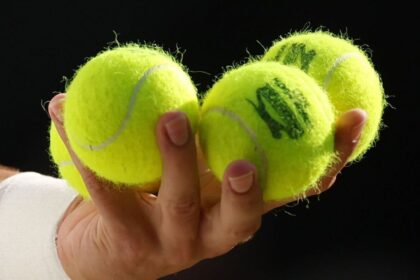In January, after the Australian Open final, Aryna Sabalenka, visibly frustrated, smashed her racket on the court. Madison Keys had achieved the surprise, and Sabalenka was left at the gates of her third consecutive title in a Grand Slam tournament. Sabalenka’s disappointment was broadcast through television screens around the world.
Months later, in the Roland Garros final, Sabalenka fell again, this time to Coco Gauff. Her frustration was evident in the post-match press conference, which quickly went viral.
Weeks later, at Wimbledon, Amanda Anisimova defeated her in the semifinals in an exciting three-set match. Sabalenka left the court, and the tournament, dejected and confused. Despite being number one in the world throughout the season and having won two level 1000 titles, she failed to perform at her best in crucial moments. She took some time off from tennis to reflect and learn from what happened.
The 27-year-old tennis player arrived in New York hungry for redemption, determined to defend her title and close her Grand Slam season with a victory.
On Saturday, the tough defeats and the agony of defeat she had felt throughout the season seemed worth it. Her performance coach, Jason Stacy, reported that Sabalenka began reading a motivational book called “Into the Magic Shop” after Roland Garros. In New York, the tennis player had her own fairytale ending.
Facing Anisimova again, but this time with the crowd in favor of the American at Arthur Ashe Stadium, Sabalenka won her fourth Grand Slam title, after a 6-3, 7-6 (3) victory in 94 minutes.
“In those two finals where I completely lost control of my emotions, I didn’t want this to happen again,” Sabalenka stated radiantly during an interview. “There were moments when I was about to let it go. But I told myself: ‘Come on. You can’t do that. You have to stay focused and keep going, keep trying.’ And that really helped me.”
Aryna Sabalenka

But with all that, a very high level of expectations has arrived, and she herself has put even greater pressure on herself. Not achieving what she knows she is capable of doing has caused collapses, such as the racket in Melbourne, as well as her speech and comments in Paris. After her 6-7 (5), 6-2, 6-4 defeat to Gauff in the Roland Garros final, Sabalenka was crying and then blamed the gusty wind for her performance.
Sabalenka was immediately labeled a “sore loser”, and some of her other comments about Gauff were even worse received by the public. (She later apologized, and Gauff graciously accepted). Sabalenka and her team then focused on the challenge of how Sabalenka could find a way to win when she wasn’t playing her best tennis or the conditions weren’t ideal. Max Mirnyi, former world No. 1 in doubles and six-time Grand Slam doubles champion from Belarus, joined Sabalenka’s team before the hard court season, and has continued to reiterate that lesson throughout their time working together.“The conditions were terrible, and she was simply better in these conditions than me,” Sabalenka told reporters. “I think it was the worst final I’ve played.”
Aryna Sabalenka
“One of my main starting points when joining the team and sometimes speaking directly with Aryna is to convey the message that there is no such thing as the perfect tennis match,” Mirnyi said on Friday. “Perfection does not exist on a tennis court. You can take the best matches of [Novak] Djokovic and [Roger] Federer or Steffi Graf… there will always be things that don’t go as planned, and it is the best champions who know how to respond and adapt in the moment, on the fly.”
Max Mirnyi

Two more games later and a tiebreak ensued. But instead of sinking under the pressure, Sabalenka, who had won her previous 19 tiebreaks, took control. Although she needed three match points, and exhaled deeply before each one, the outcome hardly seemed doubtful, and the extra points were just a mere formality. After being announced as the 2025 US Open champion, Sabalenka turned to her team in her box. While many players run off the court and up the stairs, as Sabalenka has done previously, she took her time, walking and high-fiving fans before embracing each member of her coaching team, as well as her agent and friends.“You can’t make these kinds of mistakes at important points,” she said. “Sometimes it can be crucial, according to my experience. So yes, that was the moment, but then I turned around, took a deep breath, and said: ‘Okay, it happens. It’s in the past. Let’s focus on the next one'”.
Aryna Sabalenka
With thousands of fans watching during her television interview, Sabalenka said she was going to have a few drinks at the venue’s bar to start her celebration because, “You have to enjoy it” after all the hard work. As she spoke, and the smile continued to radiate on her face, it became clear that, as devastating as the previous final defeats were at the time, it made Saturday’s triumph even sweeter. And as she looked at Anisimova’s face, stunned and stained by her own tears after losing in her second consecutive Grand Slam final, standing on the stage holding her runner-up trophy, Sabalenka couldn’t help but convey that feeling.“It’s been a tough year with those finals,” Sabalenka said moments later during the trophy presentation as she addressed her team. “I was really terrible to you guys, but come on. It’s worth it, right? Thank you so much. I love you. You are my family.”
Aryna Sabalenka
“I know how much it hurts to lose in the finals,” Sabalenka said as she turned and looked at Anisimova. “But trust me, the moment you win the first one, and you will win it… you will enjoy it even more after all the tough defeats in the finals.”
Aryna Sabalenka










